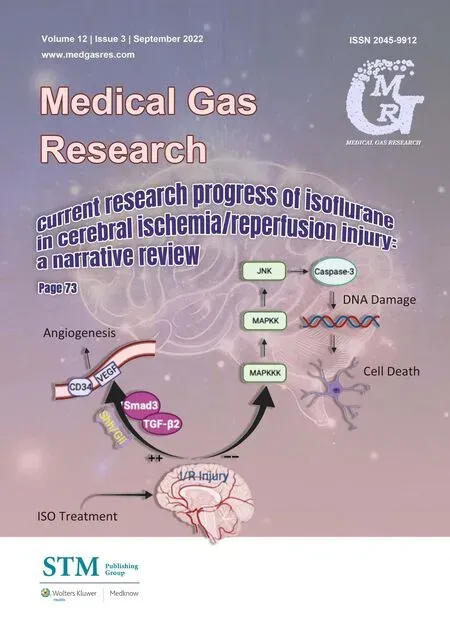Anesthesiologists and burnout:what are we missing?
2022-11-26
Dear Editor,
As we find ourselves in the middle of a roller coaster ride of a pernicious pandemic, bearing the wrath of a deadly virus, I wish to bring forth a terminology which almost forgotten but may itself turnout to be a future pandemic especially among anesthesiologists – “Burnout.” Hyman1in the article “Burnout:the ‘other’ pandemic” elucidated the definition and impact that burnout has on anesthesiologists.It is a common psychological disorder described first by Herbert J.Freudenberger2that involves complete emotional detachment from oneself and surroundings or complete denial from reality.3There are important risk factors that exhibited by a burnout patient emotional detachment, dissociation from reality (existentialism) or depersonalization, or a sense of dissatisfaction from personal accomplishments.A more explicit description of these risk factors has been mentioned by Afonso et al.’s recent study.4The Facebook, Twitter and the so called oceans of information are flooded with zillions of research on incidence, risk factors, but the true need of the hour is therapy rather than problem because many unfortunates are already showing symptoms.The coronavirus disease 2019 (COVID-19) pandemic has deprived us of love, laugh attachment, physical touch, hugs, gigs over tea and all little human needs that we enjoy as a social being.Human mind already exists in a state of complete denial – we make future plans and deny death, the ultimate solace of all living beings.Humans are humane.We have become selfish as all social animals normally behave when confronted with a danger.Future research needs to be focused not only on the incidence but also on a solid reliable thorough solution to this menace.The syndrome is important to debate because it is directly linked to professionalism, quality of care to both colleagues and patients and efficiency of working.The major factor according to a study is workplace situation rather than personal factors.Lack of adequate workplace support, too many wee hours of working (a major factor for trainees, > 40 hours per week), and lack of a supportive mentor are some of very crucial factors responsible for burnout.4,5
Going not with the flow, we would like to focus more on the actions that can contribute to destress our much needed population.A feeling of support, good leadership at workplace, good mentor and also a healthy home environment bestow positive vibes.One pertinent point that really needs to be emphasized is that workplace environment is directly related to team leader.True leadership roles include being empathetic, passionate, resolute and having a true sympathetic nature towards colleagues harboring a culture of support.5
The anesthesiologists being at greater risk demand attention because we are “Swiss army knives” contributing truly to mankind and catering to a wide arena of services in our institute.We bequest patient care in most hostile circumstances (critical care, triage areas) and practically deal with a very important element of human life (respiration), life support and sometimes even outside our comfort zones.It is high time we deal with this occupational hazard.1
Burnout is a very personal feeling sometimes just short of depression and the answer lies in personalization depending on each individual.Usually as a result of imbalance of workplace environment and personal perception hence for problem mitigation institutional intervention is welcome.It is good that people understand fellow beings, and government understands the voters rather than turning a blind eye to an obvious future pandemic.We are exhausted physically, drained mentally.Institutions must spend less time making salutations at individual level, yoga therapies, long seminars rather spend more time correcting the root cause of burnout – it may be at individual level or even departmental level.It is right time that the problem is addressed adequately otherwise patient safety, outcome and medical carrier itself is at jeopardy.6Finally congratulations to author of article that have put light on burnout among the anesthesiologists.1After all the topic is more important than discussing the number of death that the pandemic is causing.Future research on precise systematic therapy to syndrome is required rather than more literature scaring the guts out of already burned out people (we are counting ourselves in).
Priyanka Bansal*, Kunal Bansal
Department of Anesthesiology, Pandit Bhagwat Dayal Sharma Post Graduate Institute of Medical Sciences, Rohtak, Haryana, India (Bansal P)
Haryana Civil Medical Services-1, Rohtak, Haryana, India (Bansal K)
*Correspondence to:Priyanka Bansal, MD, dr.priyankabansal1986@gmail.com.
orcid:0000-0002-5900-401X (Priyanka Bansal)
doi:10.4103/2045-9912.330696
How to cite this article:Bansal P, Bansal K.Anesthesiologists and burnout:what are we missing? Med Gas Res 2022;12(3):115.
Open access statement:This is an open access journal, and articles are distributed under the terms of the Creative Commons AttributionNon-Commercial-ShareAlike 4.0 License, which allows others to remix, tweak, and build upon the work non-commercially, as long as appropriate credit is given and the new creations are licensed under the identical terms.©Article authors (unless otherwise stated in the text of the article) 2022.All rights reserved.No commercial use is permitted unless otherwise expressly granted.
杂志排行
Medical Gas Research的其它文章
- spuriously low end tidal carbon dioxide in capnometry:Nafion tube malfunction in end tidal carbon dioxide module blamed for near mishap!
- In vivo microelectrode monitoring of real-time hydrogen concentration in different tissues of rats after inhaling hydrogen gas
- Color change after tooth bleaching with ozone and 10% ozonized carbamide peroxide for in-office use
- Hydrogen-rich bath with nano-sized bubbles improves antioxidant capacity based on oxygen radical absorbing and inflammation levels in human serum
- Effects of different fresh gas flows and different anesthetics on airway temperature and humidity in surgical patients:a prospective observational study
- Comparative analgesic, hemodynamic, pain and duration of sensory and motor block effects of dexmedetomidine, granisetron, and nitroglycerin added to ropivacaine in intravenous anesthesia for forearm surgeries:a randomized clinical study
